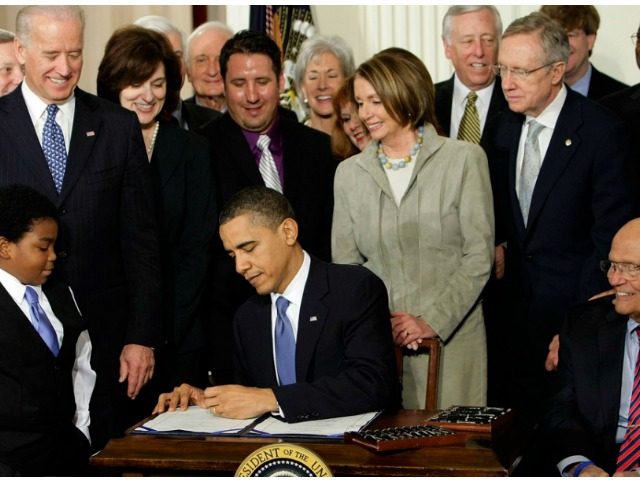President Barack Obama released a video on Monday ahead of the 10th anniversary of the signing of Obamacare, celebrating it as “the closest we’ve ever come to universal coverage in America.”
In truth, Obamacare expanded access to health insurance, primarily for the working poor, but at a massive cost to middle-class budgets. It also changed American politics for the worse, turning it into a zero-sum game in which compromise is nearly impossible.
The Good: Obamacare can be credited with two achievements. The first is increased access to health insurance, largely through Medicaid, which was originally designed to help the poor. The new law expanded eligibility to households within 133% of the poverty line, covering many lower middle-class families. Federal funds covered the initial cost, and enrollment rose by 15 million people, though conservatives worried about the long-term cost.
More generally, Obamacare enshrined the idea of a safety net for health insurance. Many conservatives argued, in principle, against making individuals more dependent on government, and in favor of private sector solutions. These debates continue, but Republicans accept that whatever alternative they propose to Obamacare will have to provide basic protections, such as covering pre-existing conditions. In that sense, Obamacare reframed the debate.
The Bad: Obamacare failed to deliver on its basic promises. It did not lower health insurance costs by up to $2500 per household per year. On the contrary, it caused health insurance premiums to skyrocket, and many Obamacare policies had deductibles so high that the insurance was effectively useless. Moreover, Obama’s promise that “if you like your doctor, you can keep your doctor” turned out to be one of the biggest lies in the history of U.S. politics.
Another area in which Obamacare failed was the cost of prescription drugs. The pharmaceutical industry bought immunity from Obamacare by promising to spend $150 million in support of the legislation, both in advertising and in support of Democratic members of Congress who had voted for the bill. It took the Trump administration’s regulatory changes to lower drug prices — and as Sen. Bernie Sanders (I-VT) often notes, they are still too high.
Moreover, Obamacare violated the Constitution. The individual mandate, which forced individuals to buy health insurance, was only saved at the Supreme Court through dubious legal gymnastics by Chief Justice John Roberts. (Ultimately, President Donald Trump killed it in his 2017 tax reforms.) There were other violations: for instance, the Obama administration violated the separation of powers by altering the statute without congressional approval.
Perhaps the most painful legacy of Obamacare is the political division it sowed. Before Obamacare, no major federal entitlement had ever been passed without bipartisan support. President Obama, facing opposition from Republicans and the public, chose not to compromise or to settle for incremental reforms. He set a precedent of pushing through dramatic changes on party-line votes, and reduced the incentives for bipartisan compromise.
Obama continues to twist the knife. In his video, he praises Obamacare supporters: “There are people alive today because of what you did.”
Not only does that statement ignore the fact that Obamacare put millions of Americans at risk by canceling their existing insurance, but it also casts opposition to the law as murder.
That sort of framing makes rational debate, and cooperation, impossible. Obamacare is not something to celebrate, but to transcend.
Joel B. Pollak is Senior Editor-at-Large at Breitbart News and the host of Breitbart News Sunday on Sirius XM Patriot on Sunday evenings from 7 p.m. to 10 p.m. ET (4 p.m. to 7 p.m. PT). He earned an A.B. in Social Studies and Environmental Science and Public Policy from Harvard College, and a J.D. from Harvard Law School. He is a winner of the 2018 Robert Novak Journalism Alumni Fellowship. He is also the co-author of How Trump Won: The Inside Story of a Revolution, which is available from Regnery. Follow him on Twitter at @joelpollak.

COMMENTS
Please let us know if you're having issues with commenting.